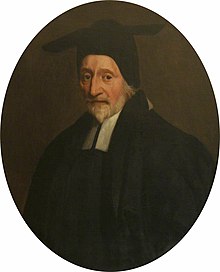Edward Pococke
Edward Pococke | |
|---|---|
 | |
| Born | 8 November 1604 |
| Died | 10 September 1691 |
| Occupation | Orientalist, writer |
| Children | Edward Pococke |
Edward Pococke (baptised 8 November 1604 – 10 September 1691) was an English Orientalist and biblical scholar.[1]
Early life
The son of Edward Pococke (died 1636),
The first result of his studies was an edition from a
At this time William Laud was both Bishop of London and chancellor of the University of Oxford, and Pococke was recognised as one who could help his schemes for enriching the university. Laud founded a Chair of Arabic at Oxford, and invited Pococke to fill it.[1] He entered the post on 10 August 1636; but the next summer he sailed back to Constantinople in the company of John Greaves, later Savilian Professor of Astronomy at Oxford, to prosecute further studies and collect more books; he remained there for about three years.[1][3]
Return to England
When he returned to England, Laud was in the
These events hampered Pococke in his studies, or so he complained in the preface to his
Post-Restoration

After the Restoration, Pococke's political and financial troubles ended, but the reception of his magnum opus—a complete edition of the Arabic history of
Personal life
Pococke married Mary Burdet in about 1646, and they had six sons and three daughters.
Edward Pococke died on 10 September 1691 and was buried in the north aisle of Christ Church Cathedral, Oxford. His monument, a bust erected by his widow, is now elsewhere in the cathedral.
Legacy
His valuable collection of 420 oriental manuscripts was bought by the university in 1693 for 600l., and is in the Bodleian (catalogued in Bernard, Cat. Libr. MSS. pp. 274–278, and in later special catalogues), and some of his printed books were acquired by the Bodleian in 1822, by bequest from the Rev. C. Francis of Brasenose (Macray, Annals of the Bodl. Libr. p. 161).
Both Edward Gibbon[5] and Thomas Carlyle exposed some "pious" lies in the missionary work by Grotius translated by Pococke, which were omitted from the Arabic text.
The theological works of Pococke were collected, in two volumes, in 1740, with a curious account of his life and writings by Leonard Twells.[1][6]
The Pococke Garden of Christ Church, Oxford is named after him, and contains the Pococke Tree, an Oriental Plane planted by him, possibly from seed he collected around 1636. This tree, with its circa nine metre girth, may be the inspiration for the Tumtum tree of Lewis Carol's poem Jabberwocky.[7][8]
References
- ^ a b c d e f g h i j k One or more of the preceding sentences incorporates text from a publication now in the public domain: Chisholm, Hugh, ed. (1911). "Pococke, Edward". Encyclopædia Britannica. Vol. 21 (11th ed.). Cambridge University Press. p. 873.
- ^ a b c Lane-Poole, Stanley (1896). . In Lee, Sidney (ed.). Dictionary of National Biography. Vol. 46. London: Smith, Elder & Co.
- ^ a b Avner Ben-Zaken, "Exploring the Self, Experimenting Nature", in Reading Hayy Ibn-Yaqzan: A Cross-Cultural History of Autodidacticism (Johns Hopkins University Press, 2011), pp. 101-125.
- ^ "Library Spotlight: 1674 Book of Common Prayer in Arabic". Salisbury Cathedral. Retrieved 7 December 2014.
- ^ Gibbon, Edward (1781). Decline and Fall of the Roman Empire. Vol II Ch. 50, n.154
- ^ Twells, Leonard (1816). The Lives of Dr. Edward Pocock: the celebrated orientalist, Volume 1. London: Printed for F.C. and J. Rivington, by R. and R. Gilbert.
- ^ "Pococke Garden". Christ Church. Retrieved 23 August 2022.
- ^ "Christ Church College's Hidden Gardens". OX Magazine. Retrieved 23 August 2022.
- Avner Ben-Zaken, "Exploring the Self, Experimenting Nature", in Reading Hayy Ibn-Yaqzan: A Cross-Cultural History of Autodidacticism (Johns Hopkins University Press, 2011), pp. 101–125. ISBN 978-0801897399
External links
- P. M. Holt, article on Pococke, Oxoniensiavol. 56, 1991
- Portraits of Edward Pococke at the National Portrait Gallery, London
- The Correspondence of Edward Pococke, Early Modern Letters Online [EMLO], ed. Howard Hotson and Miranda Lewis
- Liturgiæ Ecclesiae Anglicanae partes præcipuæ: sc. preces matutinæ et vespertinæ, ordo administrandi cænam Domini, et ordo baptismi publici; in Linguam Arabicam traductæ 1674 translation
- Liturgiæ Ecclesiae Anglicanae partes præcipuæ: sc. preces matutinæ et vespertinæ, ordo administrandi cænam Domini, et ordo baptismi publici; in Linguam Arabicam traductæ 1826 edition, digitized by Richard Mammana
